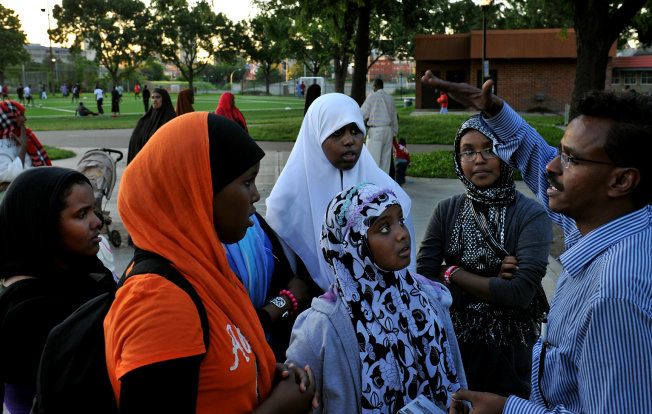
Friday September 11, 2015
By Teresa Welsh

Somali youth gather in Currie Park near the Cedar-Riverside Apartment Complex on June 27, 2011, in Minneapolis.
A year after then-Attorney General Eric Holder announced a federal pilot program to counter violent extremist recruitment in American cities, Minneapolis is moving into the implementation phase of their plan to ward off Islamic State group recruitment in its Somali community. On Wednesday, U.S. Attorney for Minnesota Andrew Luger announced the commitment of nearly $1 million to the Building Community Resilience plan in the form of a public/private partnership.
"What we have heard from young men and women, and in fact from friends and relatives of those who have gone to Syria and who are not coming back, is this is exactly what will keep people on the straight and narrow," Luger says. "As we've seen in gang prevention and other areas of crime prevention, a good mentor is an important way to avoid going off on a dangerous track. Job opportunities are as well and a stronger resilient community is in the end what's going to turn this around."
To date, more than 60 youth from the Somali community in Minnesota have gone overseas to join terrorist organizations. Two Somali youth who were part of a group stopped before they left the country earlier this year recently pleaded guilty to terrorism charges, admitting they had plans to join the Islamic State group. Such radicalization is of grave concern for the Somali community, where families and law enforcement alike are desperately trying to understand the appeal a Middle Eastern terrorist organization holds for young men who were born in the U.S. and have never been to the region.
Luger says his office conducted interviews and convened a task force with community leaders to determine what type of programs and services were most needed. The district attorney says the overwhelming consensus showed the importance of initiatives for youth, those most susceptible to Islamic State group recruitment campaigns over social media.
Funding for the initiative will be handled by Youthprise, a local nonprofit. So far, $216,000 from the federal government, $250,000 from the state of Minnesota and $390,000 in private funds have been committed to the program.
Stevan Weine, professor of psychiatry at the University of Illinois at Chicago, says the initiative is a good first step.
"I think the idea of public-private partnership is the right idea because government knows that they can't solve this problem alone. They need community partners," Weine says. "Is it enough? I think that's a reasonable question. We don't know if it's enough. The needs are very large but you have to start somewhere, and this seems like a good place to start."
But he also emphasizes that the youth initiatives need to be augmented by other programs that also focus on Somali families as a whole.
"These kind of youth empowerment initiatives are necessary but of course probably not sufficient to address the problem of violent extremism. In addition to these kinds of strategies that are part of building healthy resilient communities we need other kinds of strategies, too," Weine says. "There will need to be other layers."
Luger agrees with the need to focus on families, and his office will work with parents to prevent teenagers from radicalizing.
"There's a lot of education work and a lot of cooperation, the goal being that we don't have successful recruitment anymore and we don't need law enforcement involvement because the community is so resilient that the attempts to recruit young men and women are unsuccessful," Luger says.